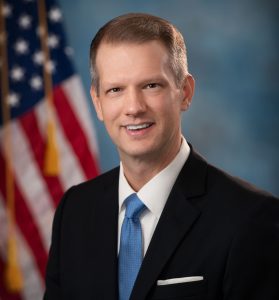WV Press Release Sharing
CHARLESTON, W.Va. – State Treasurer Riley Moore, who serves as chairman of the Hope Scholarship Board, has clarified that state law permits students to use Hope Scholarship funds for certain services provided by public charter schools but emphasized that students enrolled full-time in those schools are not eligible to participate in the Hope Scholarship program.
“Public schools – including public charter schools – are not permitted to ‘double-dip’ and receive both public funding and Hope funds for educational services,” Treasurer Moore said.
“Following recent news coverage about public charter schools and their funding issues, our Office has become aware of some confusion around the permitted use of Hope Scholarship funds for public charter school services,” Treasurer Moore said. “With regard to Hope Scholarship funds, I want to be clear that the Hope Scholarship Board approaches public charter schools and the services they provide the same as regular public schools operated by county boards of education.”
Under the Hope Scholarship Act and state law, public schools are allowed to charge Hope Scholarship students who are not enrolled full-time in their schools for certain classes or services these public schools might provide, and Hope Scholarship recipients are able to pay for these services using their award funds. This allows the public schools to be made whole, since they do not receive state funds for those students.
Recently, our office reassured the Public Charter School Board that the Hope Scholarship Act allows Hope students to use their funds to pay for similar services at public charter schools as well, so long as the schools enroll as an education service provider within the Hope program.
While public schools – including public charter schools – can charge for certain services, Treasurer Moore emphasized the student cannot use Hope funds to enroll in those schools on a full-time basis.
“Children enrolled full-time in a public charter school are ineligible for Hope Scholarship funds,” Treasurer Moore said. “Only students enrolled primarily in a nonpublic education environment could use funds at a public school or public charter school for certain additional classes or services they may wish to obtain. This restriction is what prevents public charter schools from ‘double-dipping,’ or receiving both public funding and Hope funds for these services.”
West Virginia public schools – including public charter schools – are funded through the Public School Support Plan (PSSP) outlined in state code and based primarily on school enrollment. The law makes clear Hope Scholarship students enrolled part-time in public school programs are not included in the enrollment count used in the state aid funding calculations, meaning public schools do not receive state aid funding for Hope students. The public schools may then charge the Hope Scholarship students for these part-time services, and they are eligible to pay for them using their own funds.
County boards of education are treated as educational service providers under the Hope Scholarship program by virtue of the Hope Scholarship legislative rules and are supposed to charge Hope Scholarship students tuition for part-time educational services provided to them. The West Virginia Department of Education has created a special enrollment code in the West Virginia Education Information System (WVEIS) that public schools are supposed to use for Hope Scholarship students purchasing services from the public school system so that those students are not included in the net enrollment count used for state aid funding under the PSSP.
Based on the Hope Scholarship Act, legislative rules and state code related to Public School Support Plan funding, Hope Scholarship Board counsel have clarified the following as it relates to public charter schools:
- A child enrolled full time in a public school, including a public charter school, is not eligible to participate in the Hope Scholarship Program at the same time.
- The public charter schools will not receive state aid funding under the Public School Support Plan for a student who is a Hope Scholarship student. However, Hope Scholarship students have the ability to purchase part-time educational services from public schools, including public charter schools. Since the public schools don’t receive state aid funding for the student, the Hope Scholarship students must pay tuition to receive these part-time services if they choose to purchase them from the public school system.
- The Hope Scholarship Act specifically allows Hope Scholarship students to take piecemeal classes from public schools, including public charter schools, for a fee. The fee makes the public school whole since the school does not receive state aid funding for Hope Scholarship students that are enrolled part-time in public school.
- The public school or public charter school will never be doubly compensated for providing these services, since Hope Scholarship students are not permitted to be full-time public school students and are not factored into the public school’s funding allocation.
- A public charter school may sign up as an educational service provider in the Hope Scholarship program so that Hope Scholarship students may purchase the educational services from the public charter school. This treats the public charter school the same as any other public school in West Virginia that is operated by a county board of education.
More information about the Hope Scholarship Program is available at www.hopescholarshipwv.com.






